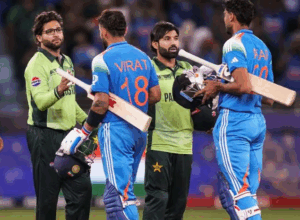BCCI Pulls Out of ACC Events Amid Rising India-Pakistan Tensions
India’s strategic cricket diplomacy reshapes Asia’s sporting landscape
In a move that blends sport with statecraft, the Board of Control for Cricket in India (BCCI) has decided to withdraw from all upcoming Asian Cricket Council (ACC) tournaments — signaling a deeper shift in how India approaches cricket diplomacy in the region.

This decision comes against the backdrop of heightened political hostilities between India and Pakistan, with sources confirming that the BCCI has formally communicated its intent to opt out of both the Women’s Emerging Teams Asia Cup scheduled in Sri Lanka next month and the Men’s Asia Cup, slated for September.
At the heart of this rift lies Pakistan’s increased influence in regional cricket governance. The ACC is currently chaired by Mohsin Naqvi, Pakistan’s Interior Minister and also the head of the Pakistan Cricket Board (PCB) — a dual role that India sees as problematic.
“The Indian team can’t participate in a tournament run by an ACC chief who also serves as a Pakistan government minister. That’s the national sentiment,” a senior BCCI official said.
“We’ve informed the ACC and remain in close consultation with the Indian government.”Asia Cup in Jeopardy
India’s exit throws the future of the Men’s Asia Cup into serious doubt. While India was initially expected to host the tournament, its absence removes the tournament’s biggest attraction: the India-Pakistan clash. This match-up not only drives record viewership but also anchors sponsorship interest across the region.
In 2024, Sony Pictures Networks India (SPNI) secured broadcasting rights for ACC events over eight years, in a deal worth $170 million. If India withdraws, the financial viability of the Asia Cup will likely collapse, forcing a potential renegotiation of terms.
Under current ACC revenue-sharing rules, full members — India, Pakistan, Bangladesh, Sri Lanka, and Afghanistan — each receive 15% of broadcast revenue, with the rest divided among associate nations. India’s withdrawal could significantly disrupt this financial ecosystem.
A Pattern of Political Boundaries in Cricket
This is not the first time that political realities have redrawn cricket’s boundaries.
In 2023, India refused to travel to Pakistan for the Asia Cup. A hybrid model was implemented, allowing India to play its matches in Sri Lanka.
In the 2024 ICC Champions Trophy, hosted by Pakistan, India again opted for a neutral venue — playing in Dubai and ultimately winning the tournament. The final was held without the host nation present.
These repeated disruptions highlight the challenges of organizing bilateral and multilateral cricket in the subcontinent, where national sentiment often outweighs sporting considerations.
The Bigger Picture: A Shifting Power Dynamic in Asian Cricket
The ACC was founded in 1983 to promote cricket in Asia and act as a counterweight to Western dominance in the sport. But with India pulling back, the future of the council — and the idea of a unified Asian cricket bloc — now hangs in the balance.
Previously led by Jay Shah, who is now the Chairman of the International Cricket Council (ICC), the ACC finds itself without its most powerful and economically influential member.
India’s current stance suggests a long-term strategic pivot — a possible effort to isolate Pakistan from regional cricket leadership, using both its political capital and commercial clout.
Final Thoughts
Sport, especially cricket in South Asia, has always carried more weight than just runs and wickets. In recent years, it’s become a proxy arena for diplomatic posturing and soft power.
The BCCI’s decision to step away from the ACC may seem like just another tournament boycott. But viewed in context, it marks a deliberate recalibration of India’s regional sports strategy — one that could redefine cricket’s power centers in the years to come.

